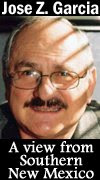
By Jose Z. Garcia
Last week Barack Obama was in Española, hoping to energize Hispanic voters there. A few numbers will make clear why. Rio Arriba County, where Española is located, has an estimated population of about 41,000, out of which nearly 30,000 (72.8 percent) are Hispanic. In 2004, Kerry’s margin of victory in Rio Arriba was 69 percent, 4,604 votes out of a total of 14,902 votes cast. In a tight race for New Mexico, that margin of victory could come in handy. So the visit makes sense.
But let us compare those numbers with Doña Ana County. The population here is about 200,000, up from 193,888 in 2006. Of these, about 65 percent are Hispanic, about 130,000.
Voter registration in Doña Ana County on Sept. 18 was 105,560, 11 percent higher than in 2004, when it was 94,345. And there are still two weeks of registration left to go. Assuming the same county-wide turnout as in 2004 (67.6 percent), this should produce 71,358 votes. Assuming a 4 percent vote for Nader, Barr and others, this would mean McCain and Obama would split about 68,503 votes between them. Heavily Democratic, Doña Ana County will almost certainly vote for Obama. But the margin of that victory is in balance and could make the difference between winning and losing the state and its five electoral votes.
Kerry won Doña Ana County in 2004 with 51.8 percent of the vote, producing a margin of 2,214 votes — not very impressive by Rio Arriba’s standards. But Kerry never really caught on in Doña Ana County. That same year, in a low-profile district judge race, Doug Driggers beat his Republican opponent by 8,549 votes. And in another low-profile race for Court of Appeals, the Democrat won by a margin of 10,998 votes.
The good news in this for Obama is that it shows a high “swing” potential in Doña Ana County, as demonstrated by these numbers. If Obama carries Doña Ana County again by 51.8 percent he will beat McCain by about 2,467 votes. But if he carries it by 57 percent (still below the 57.2 percent and 57.6 percent each winning candidate got in the judicial races cited above), he will beat McCain by 9,591 votes. Much better. And if he wins by 62 percent, he will beat McCain by a whopping 16,441 votes.
Kerry lost the whole state of New Mexico by less than 6,000 votes. Is it worth it for Obama to explore the waters in Doña Ana County? I think so.
The south valley has potential
Now let us consider the south valley of Doña Ana County. It’s 84 percent Hispanic. As of Aug. 20, it had 22,407 registered voters, which is 22 percent of the county’s total. In 2004, the south valley gave Kerry a winning margin of 58.4 percent, and a cushion of 2,586 votes — a higher cushion than the county as a whole delivered to Kerry. But even with these nice margins, south valley performance for Kerry was mediocre in comparison with the norm. That same year the Democratic candidate for Court of Appeals judge, in a low-profile race, received 68.3 percent of the vote and a cushion of 4,101 votes. The south valley turnout in 2004 was only 58.8 percent, compared to a county-wide turnout of 67.6 percent. And Richardson carried the south valley in 2006 with 81 percent of the vote, largely because he campaigned seriously there, addressing specific needs. So the south valley — by itself — has swing potential.
If Obama wins the south valley with 52 percent of the vote and a turnout of 59 percent, he will come out of the south valley with just upwards of 500 votes. But if he beats McCain by 70-30 with a turnout of 65 percent he will get about 10,195 votes, while McCain will get only 4,369 — a margin of 5,826, almost the exact margin of victory for George Bush in 2004 (5,988).
The south valley is a fascinating place. El Paso is spilling into New Mexico as it explodes with a $4 billion expansion of Ft. Bliss. The largest maquila plant in Mexico is being built on the Mexican side of the border at the Santa Teresa crossing, promising to spill growth onto the U.S. side as well. Several communities in the valley are among the poorest in the state, with per-capita incomes in the $6,500-$8,500 range, in comparison with a New Mexico per-capita income of over $21,000, according to the 2000 Census.
Other communities are firmly in the middle class, and upper class residents with horses and vineyards mingle in as well. In spite of its overall poverty, the south valley is well organized politically and has a mind of its own. It gave Richardson 81 percent of the vote in 2006 and then turned around and organized against the governor the very next year when he tried to get them to increase their taxes for a spaceport project in a neighboring county. Like most of southern New Mexico, the south valley feels severely neglected by the north — Santa Fe is about 300 miles away, and politicians rarely stop by to pass out favors.
After snooping around awhile, the south valley appears to me to be less than fully enthusiastic about the presidential campaign, but ripe for a shot in the arm. Sound to you like the kind of place Barack might just want to visit this campaign season?
Garcia is a government professor at New Mexico State University and a former chairman of the Democratic Party of Doña Ana County.

